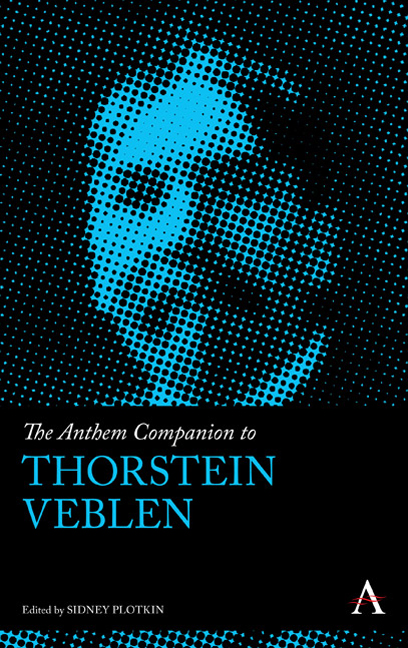Book contents
- Frontmatter
- Dedication
- Contents
- Acknowledgments
- Introduction: Thorstein Veblen's Elusive Project
- Part I METHOD, PHILOSOPHY AND VALUES
- Contents
- Chapter One The Instinct of Workmanship and Other Philosophical Concepts in Thorstein Veblen's Methodology
- Chapter Two Reconsidering Thorstein Veblen's Use of Instincts
- Chapter Three Roman Catholic Critics of Thorstein Veblen and Institutional Economists
- Chapter Four The Metaphysical World of Thorstein Veblen: Of and Beyond the Here and Now
- Chapter Five Veblen's Position on Education Analyzed and Reformulated
- Part II CAPITALISM, SOCIAL STRUCTURE AND POLITICS
- List of Contributors
- Index
Chapter Five - Veblen's Position on Education Analyzed and Reformulated
from Contents
Published online by Cambridge University Press: 10 January 2018
- Frontmatter
- Dedication
- Contents
- Acknowledgments
- Introduction: Thorstein Veblen's Elusive Project
- Part I METHOD, PHILOSOPHY AND VALUES
- Contents
- Chapter One The Instinct of Workmanship and Other Philosophical Concepts in Thorstein Veblen's Methodology
- Chapter Two Reconsidering Thorstein Veblen's Use of Instincts
- Chapter Three Roman Catholic Critics of Thorstein Veblen and Institutional Economists
- Chapter Four The Metaphysical World of Thorstein Veblen: Of and Beyond the Here and Now
- Chapter Five Veblen's Position on Education Analyzed and Reformulated
- Part II CAPITALISM, SOCIAL STRUCTURE AND POLITICS
- List of Contributors
- Index
Summary
David Riesman captures the gist of Thorstein Veblen's sociology with the pithy claim that “modernity is only a latter- day barbarism” ((1955) 1995, 3). This startling assessment contradicts the basic assumption in most social theories that modernity replaces, neutralizes or at least tames barbarism. The barbarian, for Veblen, is one who uses force or fraud to achieve his or her ends. In The Theory of the Leisure Class, Veblen wrote, “As it finds expression in the life of the barbarian, prowess manifests itself in two main directions— force and fraud. In varying degrees, these two forms of expression are similarly present in modern warfare, in the pecuniary occupations, and in sports and games” ((1899) 1967, 273). To the extent that Veblen holds a theory of “progress,” he argues that brutal, physical force is the more ancient form of barbarism, and is gradually being replaced by less physical forms of the use of force, such as coercion, fraud and chicanery used to achieve pecuniary gain. He isolates “the pecuniary occupations,” especially business and advertising, as the most prevalent types of modern barbarism. He warns that pecuniary interests would gradually and eventually dominate modern culture, and referred to modernity as the “pecuniary era of civilization” ((1918) 1957, 53). The “predatory” culture of barbarism is opposed by the “peaceable” culture whose chief characteristics, according to Veblen, are what he calls “the parenting bent,” “the instinct for workmanship” and “idle curiosity.”
For Veblen, the predatory barbarian and the peaceable type coexist and also clash in all cultures, in all periods of history, as key forces in evolutionary naturalism, but in modern times, the predatory type holds the upper hand. Veblen's understanding of the paradoxical modern- barbarian informs all of his writings and the topics that he investigated: sports, religion, warfare, business, higher education, leisure, pets, the profession of law and so on. For Veblen, as modernity progresses, all social institutions become increasingly predatory and favor the barbaric social type. More precisely, Veblen isolated business principles as the chief form of modern barbarism.
My focus in this chapter is on the conjunction of modern- day barbarism with the institution of education. This linkage may seem odd, even shocking, to the reader not familiar with Veblen's writings, but it flows easily from his writings.
- Type
- Chapter
- Information
- The Anthem Companion to Thorstein Veblen , pp. 129 - 148Publisher: Anthem PressPrint publication year: 2017

